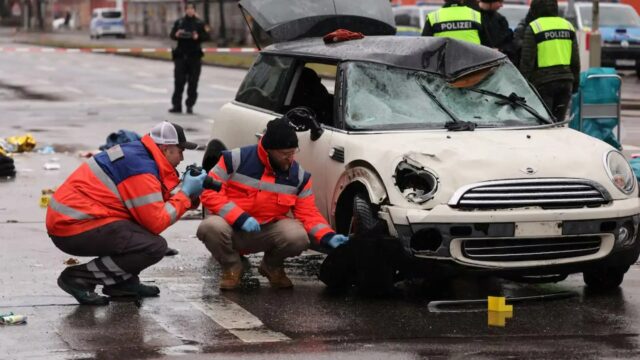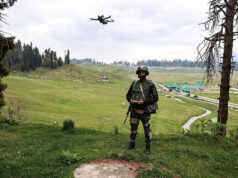
Munich was rocked by a violent attack when a 24-year-old Afghan asylum seeker, identified as Farhad N., deliberately drove his vehicle into a crowd during a trade union demonstration, leaving at least 28 people injured. The incident has reignited a fierce debate over Germany’s immigration policies and security measures, especially as the country approaches a crucial national election in just ten days.
The Attack: A Deliberate Act of Violence
The attack took place in a public square where demonstrators had gathered for a trade union protest. Witnesses described the terrifying moment when the speeding car rammed into the crowd, sending people fleeing for their lives. Emergency responders quickly arrived at the scene to treat the injured, some of whom suffered severe wounds.

Law enforcement acted swiftly, with an officer firing a shot at the vehicle to bring it to a stop before arresting the suspect. Officials are treating the incident as an act of terrorism, though investigations are ongoing to determine whether Farhad N. had connections to extremist groups or acted alone.
The Suspect: A Case That Highlights Immigration Challenges
Farhad N. first entered Germany in 2016 during the height of the European migrant crisis. He applied for asylum but was ultimately denied. However, like many rejected asylum seekers, he was not deported due to bureaucratic hurdles and legal challenges. This case underscores a growing issue in Germany’s immigration system—thousands of individuals with failed asylum claims remain in the country, often in legal limbo.
Government Response: Calls for Stricter Immigration Policies
Chancellor Olaf Scholz wasted no time in addressing the attack, condemning it in the strongest terms and promising decisive action. “This man must face consequences and leave the country,” Scholz declared, signaling a tougher stance on asylum enforcement. He emphasized that violent individuals who pose a threat to public safety must not be allowed to stay in Germany.
Authorities have vowed to review deportation policies and tighten enforcement measures to prevent similar incidents. The attack has also renewed discussions on improving background checks and security screenings for asylum seekers.
Political Ramifications: Immigration Becomes a Key Election Issue
With the national election just days away, the Munich attack has added fuel to an already heated political debate. The far-right Alternative for Germany (AfD) party, known for its strong anti-immigration stance, has seized upon the incident to argue for stricter border controls and mass deportations of failed asylum seekers.
AfD leaders have blamed the German government’s immigration policies for allowing dangerous individuals to stay in the country. The party has already been gaining momentum in recent months due to rising concerns over crime and national security. This attack is likely to further boost their support among voters who feel the government has been too lenient on immigration.
Meanwhile, centrist and left-wing parties are urging caution, warning against using the tragedy for political gain. They argue that focusing solely on deportations without addressing broader integration challenges and social policies could create further divisions within German society.
Security Concerns: A Renewed Focus on Counterterrorism
The Munich attack has also highlighted concerns about Germany’s preparedness to prevent and respond to such incidents. Law enforcement agencies have faced criticism in the past for failing to track potentially dangerous individuals who remain in the country despite being denied asylum.
Security experts are calling for stronger monitoring of high-risk individuals, including those with extremist tendencies or violent criminal records. Some officials are pushing for increased cooperation between European intelligence agencies to track potential threats more effectively.
What’s Next? The Future of Germany’s Immigration Policy
As Germany grapples with the aftermath of this attack, the government faces mounting pressure to take concrete action on immigration enforcement and public safety. The outcome of the upcoming election could determine the country’s future approach to asylum policies, deportations, and security measures.
For now, Munich mourns the victims of this senseless act of violence while the nation debates how to prevent such tragedies in the future. The coming days will be crucial in shaping both political narratives and government policies on immigration and national security.



